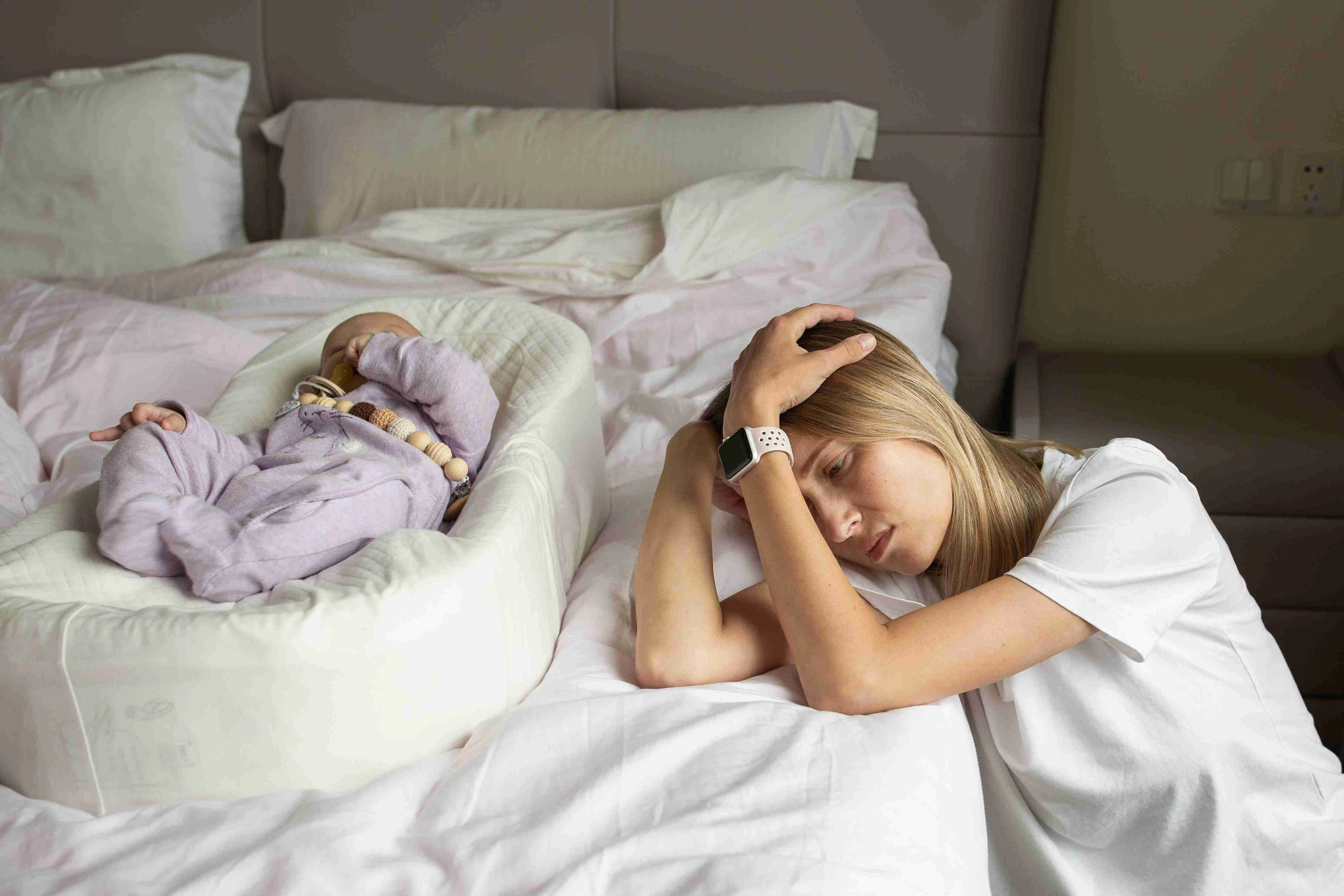Postpartum insomnia is a common yet often overlooked challenge that many new mothers face after childbirth. This sleep disruption can stem from a combination of hormonal changes, emotional struggles, and the rigorous demands of infant care.
Understanding postpartum insomnia is crucial, as it not only affects a mother's well-being but can also impact her ability to bond with her baby and manage daily responsibilities. In this article, we will explore the causes, consequences, and potential solutions to postpartum insomnia.
Definition of Postpartum Insomnia
Postpartum insomnia, one of the types of insomnia, is considered a sleep disorder that affects many new mothers after giving birth. It is characterized by persistent trouble falling asleep or experiencing non-restorative sleep.
This condition can be both physically and emotionally draining, leaving you feeling exhausted and overwhelmed during a time when you need all the energy and support you can get.
Postpartum insomnia is a common experience, and it's essential to understand that you are not alone in this struggle. Many new mothers face similar challenges as their bodies and minds adjust to the significant changes of parenthood.
Causes of Postpartum Insomnia

Postpartum insomnia can arise from various factors, both physical and emotional. Here are some common causes:
Hormonal Changes
After childbirth, the body undergoes significant hormonal fluctuations. Changes in estrogen and progesterone levels can disrupt sleep patterns, contributing to insomnia.
Postpartum Anxiety
Many new mothers experience heightened anxiety related to their new responsibilities and concerns about their baby's health. This anxiety can lead to racing thoughts and difficulty falling or staying asleep.
Postpartum Depression
Postpartum depression is a serious condition that affects some mothers after childbirth. Symptoms can include insomnia, fatigue, and feelings of hopelessness, all of which can further disrupt sleep.
Newborn Care
The demands of caring for a newborn, including frequent feedings and diaper changes, can interrupt a mother's sleep schedule. The stress of ensuring the baby is safe and healthy can also make it difficult to relax.
Physical Discomfort
Discomfort from healing after childbirth, such as pain from stitches or soreness, can make it challenging for mothers to find a comfortable sleeping position, impacting their ability to sleep well.
Environmental Factors
External factors like noise, light, or an uncomfortable sleeping environment can also play a role. The presence of a newborn may change the household dynamic, leading to less restful sleep.
Postpartum Insomnia Symptoms

The symptoms of postpartum insomnia can vary from person to person, but some common signs include:
Difficulty Falling Asleep
One of the primary symptoms of postpartum insomnia is the inability to fall asleep, even when exhausted. New mothers may find themselves lying awake for extended periods, tossing and turning despite feeling physically tired.
Frequent Awakenings
Postpartum insomnia often manifests as frequent awakenings throughout the night, even when the baby is not demanding attention. New mothers may find themselves waking up multiple times, struggling to return to sleep after each interruption.
Feeling Unrested
A hallmark symptom of postpartum insomnia is the persistent feeling of being unrested, even after seemingly adequate sleep opportunities. New mothers may wake up feeling as tired as when they went to bed, lacking the refreshed sensation typically associated with a good night's sleep.
Mood Swings
Postpartum insomnia can significantly contribute to mood swings in new mothers. The combination of sleep deprivation and hormonal fluctuations can lead to heightened emotional sensitivity and reactivity.
Difficulty Concentrating
Postpartum insomnia often leads to significant difficulties with concentration and cognitive function. Sleep deprivation can impair attention span, making it challenging for new mothers to focus on tasks or follow conversations.
Increased Anxiety
Postpartum insomnia often goes hand-in-hand with increased anxiety levels. The lack of sleep can heighten feelings of worry and unease, creating a cycle where anxiety fuels insomnia, and insomnia exacerbates anxiety.
New mothers may experience excessive concern about their baby's well-being, their ability to parent effectively, or their health.
Risk Factors
Postpartum insomnia risk factors can differ among individuals, but some typical indicators include:
History Of Insomnia
A previous history of insomnia or sleep disturbances significantly increases the risk of developing postpartum insomnia. Women who have struggled with sleep issues before pregnancy may find these problems exacerbated during the postpartum period.
Mental Health Conditions
Pre-existing mental health conditions can significantly increase the risk of postpartum insomnia. Women with a history of anxiety disorders, depression, bipolar disorder, or other mood disorders are more susceptible to sleep disturbances after childbirth.
The hormonal fluctuations and life changes associated with the postpartum period can exacerbate these conditions, leading to increased sleep difficulties.
Lack Of Support
Insufficient social and emotional support is a significant risk factor for postpartum insomnia. New mothers who lack a strong support system may find themselves overwhelmed with the constant demands of infant care, leading to increased stress and sleep disturbances.
The Impact of Postpartum Insomnia on New Mothers
Postpartum insomnia can have far-reaching consequences for new mothers if left unattended. Some potential impacts include:
Physical Exhaustion
Lack of sleep can lead to severe fatigue, making it difficult for new mothers to care for their newborns and manage daily activities. This exhaustion can hinder recovery from childbirth and contribute to a cycle of fatigue.
Emotional Strain
Insomnia can exacerbate feelings of anxiety and depression, increasing the risk of postpartum mood disorders. New mothers may experience heightened irritability, mood swings, and feelings of overwhelm, which can affect their overall emotional health.
Cognitive Impairment
Sleep deprivation can impair cognitive functions, including memory, concentration, and decision-making. New mothers may struggle to focus on tasks, remember important information, or respond effectively to their baby's needs.
Relationship Challenges
Postpartum insomnia can strain relationships with partners, family, and friends. Emotional volatility and fatigue can lead to misunderstandings and conflict, making it essential for partners to communicate openly and support each other.
Breastfeeding Difficulties
Fatigue and sleep deprivation can interfere with breastfeeding, impacting a mother's milk supply and ability to maintain a consistent feeding schedule. This can lead to added stress and feelings of inadequacy for mothers trying to establish breastfeeding.
Postpartum Insomnia Treatments

While postpartum insomnia can be challenging, there are various strategies you can employ to improve your sleep quality and overall well-being. Here are some effective approaches:
Establish a Consistent Sleep Routine
Creating a consistent sleep routine is crucial for managing postpartum insomnia. Despite the unpredictable nature of newborn care, try to establish regular sleep and wake times as much as possible. This helps regulate your body's internal clock and improve sleep quality.
Begin a relaxing bedtime routine about 30 minutes before sleep, which might include activities like reading, gentle stretching, or listening to calming music.
Create a Sleep-Conducive Environment
Make your sleeping space as comfortable as possible. Keep the room dark, quiet, and cool to promote restful sleep. Consider using blackout curtains, white noise machines, or earplugs to minimize disturbances. A comfortable mattress and pillows can also make a significant difference.
Practice Good Sleep Hygiene
Adopting good sleep hygiene can enhance your ability to fall asleep and stay asleep. This includes limiting screen time before bed, avoiding caffeine and heavy meals in the evening, and creating a calm pre-sleep routine that signals to your body it's time to wind down.
Engage in Relaxation Techniques
Incorporating relaxation techniques such as deep breathing, meditation, or gentle yoga can help calm your mind and prepare your body for sleep. These practices can reduce anxiety and promote a sense of well-being, making it easier to fall asleep.
Seek Support
Don’t hesitate to reach out for help from family or friends. Sharing the responsibilities of newborn care can provide you with much-needed breaks, allowing you to catch up on sleep. Consider joining a support group for new mothers to share experiences and coping strategies.
Prioritize Self-Care
Taking time for yourself is essential for mental and physical health. Engage in activities you enjoy, whether it’s a short walk, a warm bath, or a hobby. Prioritizing self-care can help reduce stress and improve your overall mood, which may contribute to better sleep.
Consider Cognitive Behavioral Therapy For Insomnia (CBT-I)
If insomnia persists, consider seeking professional help through cognitive behavioral therapy for insomnia (CBT-I). This evidence-based therapy focuses on changing thoughts and behaviors related to sleep and has been shown to be effective in treating insomnia, even in postpartum women.
Natural Remedies for Postpartum Insomnia
In addition to lifestyle changes, there are several natural remedies that may help alleviate postpartum insomnia. However, it's essential to consult with your healthcare provider before trying any new remedies, especially if you are breastfeeding.
Herbal Teas
Certain herbal teas, such as chamomile, valerian root, and lavender, are known for their calming properties if you can't sleep at night. Drinking a warm cup of herbal tea before bedtime can promote relaxation and help prepare the body for sleep.
Essential Oils
Aromatherapy using essential oils like lavender or bergamot can create a soothing environment. Diffusing these oils in your bedroom or adding a few drops to your bath can enhance relaxation and improve sleep quality.
Magnesium Supplements
Magnesium plays a crucial role in regulating sleep and may help ease anxiety and muscle tension. Taking magnesium supplements or incorporating magnesium-rich foods, such as nuts, seeds, and leafy greens, into your diet may support better sleep.
Melatonin
Melatonin is a hormone that helps regulate the sleep-wake cycle. Some new mothers find that melatonin supplements can assist in reestablishing a normal sleep pattern. Always consult your healthcare provider for appropriate dosing and guidance.
Light Therapy
Exposure to natural light during the day can help regulate your circadian rhythm. Additionally, using a light therapy box in the morning can improve mood and alertness, making it easier to sleep at night.
FAQs
Is postpartum insomnia common?
Yes, postpartum insomnia is a common experience for many new mothers. It is estimated that up to 50% of new mothers experience some form of sleep disturbance during the postpartum period.
How long does postpartum insomnia typically last?
The duration of postpartum insomnia can vary. For some women, it may resolve within a few weeks or months as their bodies and sleep patterns adjust. However, for others, it can persist for several months or even longer, especially if underlying factors like anxiety or depression are present.
Can postpartum insomnia affect breastfeeding?
Yes, postpartum insomnia can impact breastfeeding. Lack of sleep and fatigue can make it more challenging to establish and maintain a successful breastfeeding routine. Additionally, stress and exhaustion can potentially affect the milk supply.
Is it safe to take sleep medications while breastfeeding?
It is generally recommended to avoid taking sleep medications while breastfeeding, as some medications can pass through breast milk and potentially affect the baby. However, if your insomnia is severe and impacting your well-being, consult with your healthcare provider to discuss safe options.
Can postpartum insomnia lead to postpartum depression?
While postpartum insomnia and postpartum depression are separate conditions, they can be interconnected. Chronic sleep deprivation can exacerbate symptoms of depression, and conversely, depression can contribute to insomnia.
How can partners or family members support a new mother with postpartum insomnia?
Partners and family members can provide practical assistance, such as helping with nighttime feedings, household chores, or caring for the baby during the day to allow the new mother to rest. Emotional support, encouragement, and understanding are also crucial during this challenging time.
Conclusion
Addressing postpartum insomnia is essential for the health and well-being of new mothers. By recognizing the factors that contribute to sleeplessness and understanding its far-reaching effects, mothers can take proactive steps toward improving their sleep quality.
Support from partners, family, and healthcare providers can play a vital role in navigating this challenging period. With the right strategies and resources, new mothers can find relief, allowing them to embrace the joys of motherhood with renewed energy and clarity.
Karen Barnard
Karen is a Human Movement Science expert and a certified sports nutrition and massage therapist. At Sleepiverse, she combines her passion for human movement science and sleep health to educate herself and her readers about healthier sleep. In addition to writing articles, Karen manages a fitness studio offering private training, athletic conditioning, and sports massage therapy. She focuses on providing people with a holistic environment for people to reach their health goals, often incorporating stretch therapy to promote mental tranquillity and help people improve their sleep.


